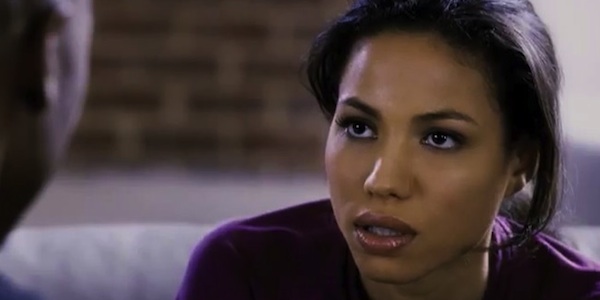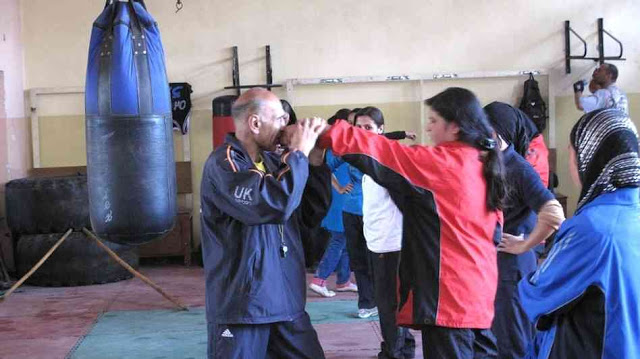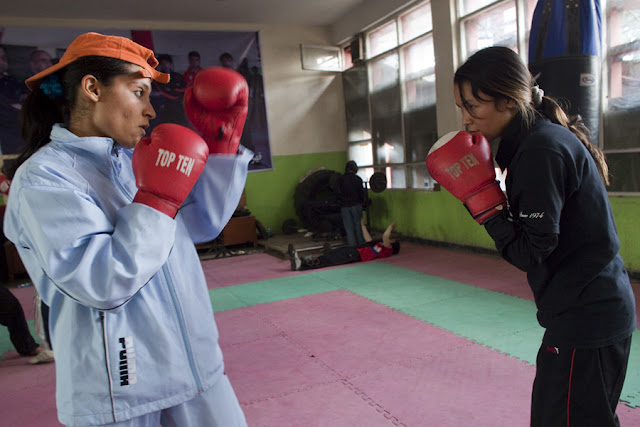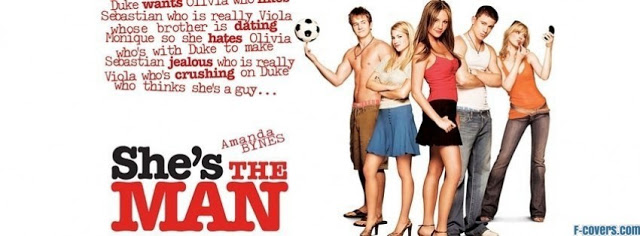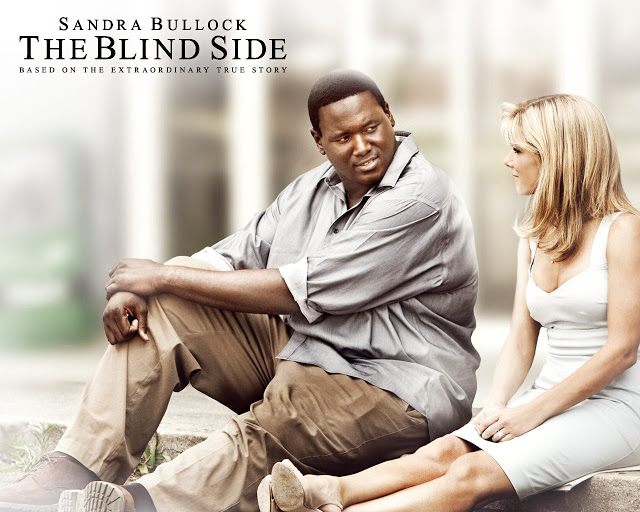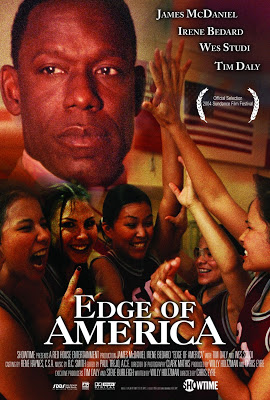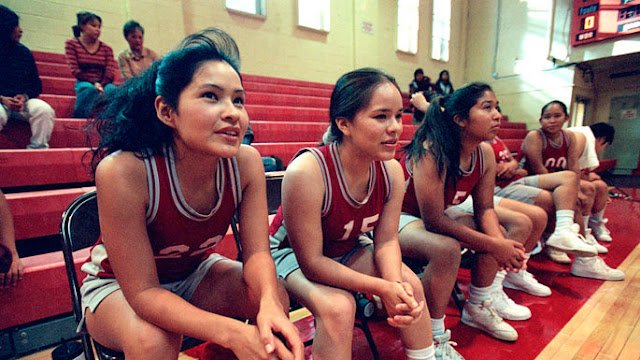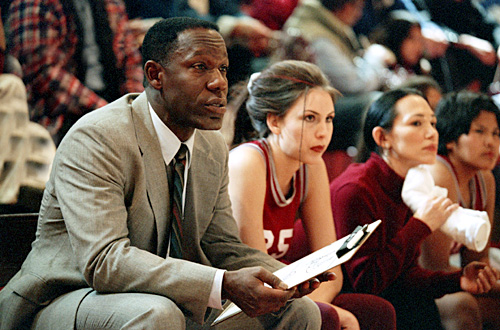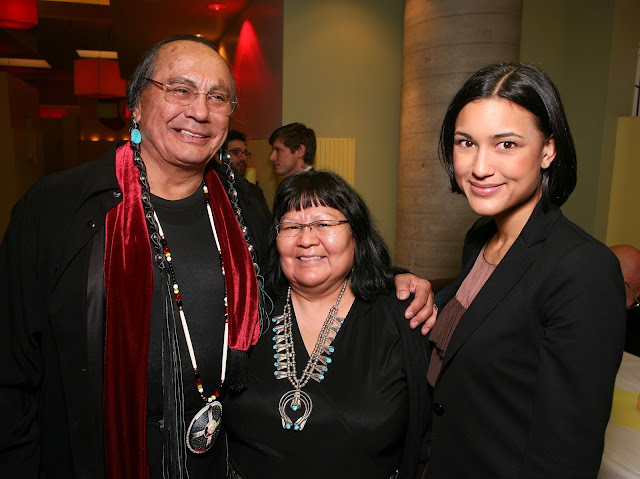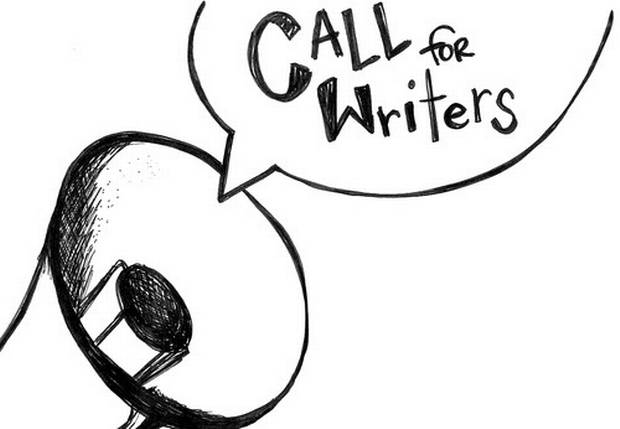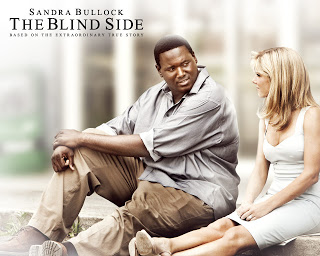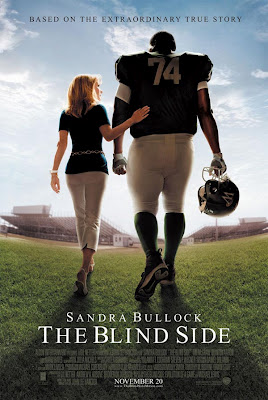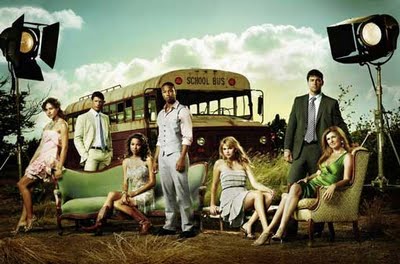 |
| The cast of Sports Night |
This is a guest post by Artemis Linhart.
“If you haven’t binge-watched Sports Night within one weekend, then you haven’t seen Shakespeare the way it was meant to be played.”*
This nuanced end-of-90s sitcom offers a peek behind the scenes of a cable sports news show, all the while mixing genuinely serious story arcs with brilliantly written characters and conversations. Captivating on many levels, the series experienced an untimely cancellation after just two seasons, which, for the most part, when it comes to television, is a sign of high yet underappreciated quality.
Taking a closer look at the female characters of the show, it is palpable that, while Sorkin views women as crazy, neurotic and flawed individuals, he sees all people as such.
This is precisely the reason why the show, not unlike his other shows, is said to be exceptionally well-written. While Sorkin is known to write most of his material himself (though it has been said that he is stingy when it comes to the sharing of writing credit), it is unsurprising that he has achieved just about cult status amongst fans for recycling whatever works. And work they do, the female characters of Sports Night–as women, as professionals, but most of all as believable human beings.
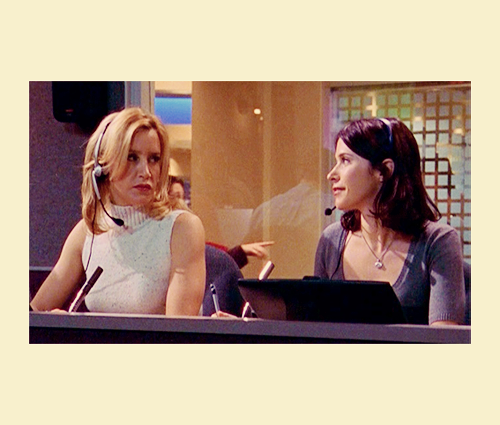 |
| Felicity Huffman as Dana Whitaker and Sabrina Lloyd as Natalie Hurley in Sports Night |
Like A Boss
On this show, it is the women who are in charge. The main characters besides the two male news anchors are Dana, the producer of Sports Night, and Natalie, her second-in-command and associate producer. They literally run the show, and not just on their network. From time to time, this is noted on a meta-level. At one point, after there has been a bomb threat to their office building, it is the guys who are freaking out, whereas the women remain calm.
As Dana tells them to pull themselves together, she concludes, “We’re in charge. We’re women in charge. And we’re keeping it together. That’s what we do.” Casey replies, sullenly, “Well, we’re men, and we’re petrified. That’s what we do.”
 |
| Dana meets with Casey (Peter Krause) and Isaac (Robert Guillaume) |
Similarly, Natalie holds an important position and is well aware of it. She never seems hesitant with regard to decision making or apologetic about being in a position of control. As they are already dating, Jeremy playfully notes, “You’ve taken to bossing me around a lot, you know that?”
The following conversation ensues:
Natalie: Yes. You know why?
Jeremy: ‘Cause you’re my boss?
Natalie: Bull’s-eye, Jerome.
There is a mutual understanding about who’s boss, and there isn’t a moment in the series’ two seasons where women’s authority is questioned or dishonored.
Dana and Natalie are a team both on and off the air. They are not just coworkers but also very close friends and have a very strong bond akin to sisterhood. Team spirit is big on Sports Night as it is but, what is more, there is a very tangible solidarity amongst women. Not once do we see a cat fight, a trope so frequently employed in realms of television where women are involved. Arguments overflow with emotions at best, but never do they result in pettiness. They are invariably based at the very least on mutual respect and dignity.
Even Dana’s interactions with her coworker Sally Sasser, who turns out to be “the other woman” for both Dana’s long-time friend (with coveted benefits) Casey and her fiancé Gordon, are not spiteful but professional. The one time Dana attempts to confront Sally in rage results in the realization that it is not her place to reproach her. Halfway through her tirade, she ends up apologizing and they reconcile.
 |
| Natalie and Dana |
Another particularly remarkable aspect is that these women are in no way portrayed as “butch,” highlighting the (seemingly little-known) fact that characteristics typically associated with femininity (physical and otherwise) and a genuine passion for sports are, in fact, not contradictory.
Between garbage can basketball and obsessing over stats, there is no way they could be mistaken for anything but authentic sports geeks. This is especially accentuated by the recurring role of Jenny, an adult film actress with a keen interest in sports and a solid command of baseball trivia.
While being the boss and being a woman do not pose a discrepancy on the level of the show itself, funnily enough, it is Dana, who, at one point, says:
“You know, you’re the boss all day long, and you’re barking out these orders and you just want… I don’t know. A check on your femininity, when you’re done.”
Coming from Dana, this is somewhat surprising, as it has never seemed to bother her in this particular way. She has always been the epitome of the gorgeous, desirable woman who just happens to be a sports nut (a type of person Sports Night is heavily populated with). As a matter of fact, just a few episodes prior, Dana appears in a revealing leather outfit, as she is on her way to a “biker chick” themed bachelorette party. While putting on her high heel boots, she asks Natalie:
“Tell me something. Why would the nickelback have set up five yards off the line on third-and-one inside the 50 and they’ve been going off-tackle all day?”
Clearly, this is a reference that only outright American Football enthusiasts would get. Her cascade of a monologue in sports jargon illustrates that her in-depth knowledge of sports goes hand in hand with her femininity, despite popular belief on and off television.
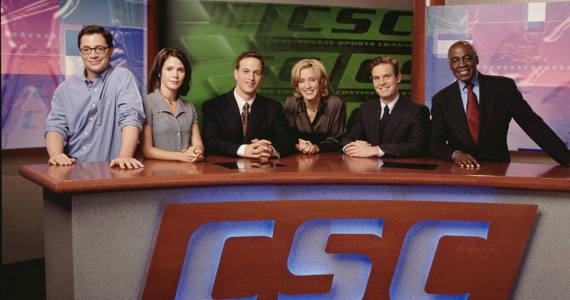 |
| The cast of Sports Night (Joshua Malina as Jeremy Goodwin on the left) |
Dana doesn’t just run the show that she produces, she actually runs the show everywhere else, as well. You might call her a bit of a control freak that, in all her neurotic ways, evokes comparison to Monica Geller on Friends. Dana is the center of the group who often speaks up for or makes decisions for others. Of all the women in charge in her group of friends and coworkers, she is without a doubt the leader. Just as she calls the shots on Sports Night, Dana does so in her private life. This is especially the case with her best friend Natalie, who looks up to her, and her long time love interest Casey. During the budding of Dana and Casey’s flawed romance there is barely a moment where Casey asserts himself. As he finally asks her out after 90 days of pondering, he receives a slight scolding for having waited too long.
Neil Finn’s song, “She Will Have Her Way,” is used in the Season 2 premiere as well as multiple times throughout the season. And, as is always the case with Dana, she will have her way. Right up until she doesn’t. On the night of what should be their first date, Dana claims to have had an epiphany and presents her new “dating plan”: instead of the two of them going out on a date as planned, they will postpone it, while Casey has to date other women for 6 months. The logic of this eludes everyone but Dana herself, yet she will not let go of the idea until it blows up in her face, as Casey finally decides to move on with one of the women he went on a mandatory date with.
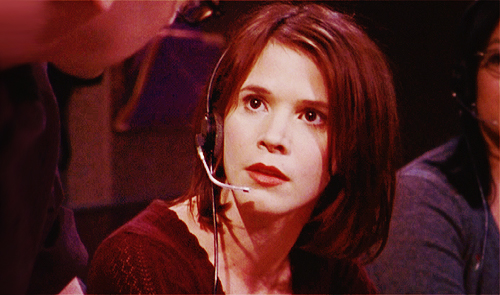 |
| Natalie in Sports Night |
With regard to Natalie, one might point out that she has certain qualities of a Manic Pixie Dream Girl. On looking more closely, however, it becomes clear that her character can rather be seen as a deconstruction of the trope. Bearing in mind that Sports Night premiered in 1998, a full seven years before the term was coined, Sorkin seems to have unwittingly been very much ahead of his time.
Besides being a stunningly beautiful and intelligent woman, she is portrayed as slightly quirky (though hardly any crazier than the rest of Sports Night‘s main characters). She often resorts to bizarre, impulsive behavior and clearly serves a purpose for Dan’s troubled character on several occasions. However, she is very well aware of her captivating charm and peculiarity and alludes to it every now and then. As for her relationship with Jeremy, she does partly hold the position of the vivacious, upbeat character that struggles to grab Jeremy by the hand, teach him to embrace life and, essentially, “live a little.” Yet, instead of reducing her to this function, Sorkin depicts her as an independent woman. It becomes clear that she is mainly looking out for her own interests. On an equally important note, Natalie doesn’t succeed in her efforts to get Jeremy to savor life and step out of his comfort zone until ultimately this is the reason they break up.
A Big Thing Badly
Sports Night experiences a crisis in one of the first few episodes, as Natalie is sexually assaulted by an athlete. In general, not a lot of backstory on Natalie is revealed in the course of the series, whereas we learn quite a bit about the family members of the rest of the ensemble cast. Consequently, this episode highlights her character in quite a meta way. It is established early on that Natalie prefers not to talk about private matters. She tries to dismiss the incident and only mentions it to her staff as they find out elsewhere.
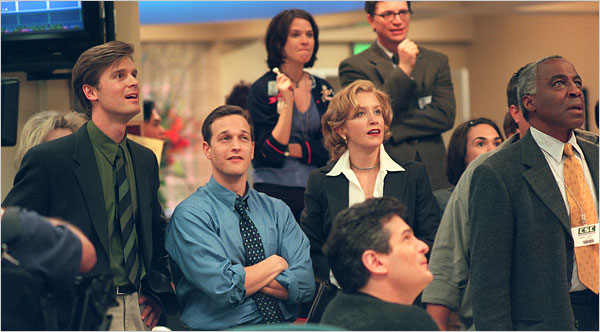 |
| The cast of Sports Night watches a game |
The incident poses a conflict on many levels. It is Dana who sends Natalie to do a pre-interview with a football player who happens to be a convicted felon. The objective is to question him about the off-limits topic of domestic violence against his girlfriend. Instead of sending Jeremy, Dana uses Natalie to “provoke a better response to the questions.”
As the assault is revealed, Dana exploits this to get an exclusive story. Realizing the highly problematic nature of her decision, she nonetheless makes a deal with the athlete’s representatives, having the ratings of her television show in mind:
Dana: “Despite a mountain of fairly immutable evidence, I am prepared to believe that what happened to Natalie didn’t happen to Natalie. And I’m confident I can persuade Natalie to see it the same way.”
In exchange for their discretion they would get 5 minutes of air time touching on the topic that would otherwise have been off limits.
Eventually, Dana calls off the interview altogether only three minutes before the show in an effort to do the right thing after all. Ultimately, the prospect of an exclusive news story makes way for decency regarding this sensitive subject.
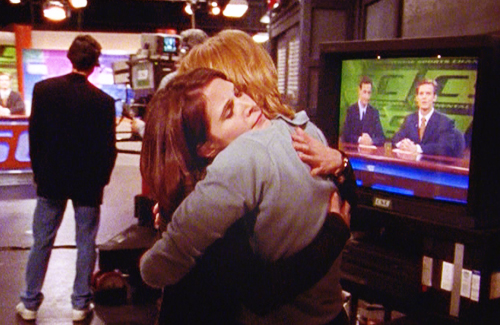 |
| Natalie and Dana hug it out |
Interestingly, the incident provokes a particularly adverse reaction in Jeremy, who at that time already carries a torch for Natalie. While the knight in shining armour attire certainly isn’t tailor-made for a type like Jeremy, he nonetheless feels compelled to take the athlete aside and warn him: “You touch her again, I’m gonna have you killed.” In a comment evidencing the show’s capacity to treat serious subjects with sharp and subtle humor, he goes on to say, “Do you understand what I’m saying? I’m gonna pay someone $50 to have you killed.”
Following the assault, Natalie gets death threats of her own. She literally gets slut shamed in the subsequent episode when a hateful message reaches her via email, saying “Dear slut, You should never have been in that locker room where men have just played the game of football.”
 |
| Felicity Huffman as Dana Whitaker in Sports Night |
In the mean time, she receives special treatment from her co-workers. Initially, the crew wants to shelter her by giving her the rest of the night off. “Am I being fired?” she asks, assuming the position of being doubly victimized. As Natalie is distracted and makes mistakes later on, her staff is very understanding and refrains from calling her on it – very much to her distaste:
“Why not? Why aren’t you laughing at me? Why aren’t you mad at me? (…) Look, all I want is to get it right, and when I don’t, I expect to be treated like a professional. I expect to be yelled at. I want to be treated like the show is still important. I want to be treated like my job is still important!”
She sees her career in jeopardy, which she later explains to be the reason why she’d rather not have the public know about the incident. Natalie refers to a Boston Globe reporter whose story of sexual assault by an athlete was exposed, and asserts: “There isn’t a female sports journalist that didn’t learn their lesson from it.”
 |
| Josh Charles as Dan Rydell and Peter Krause as Casey McCall in Sports Night |
Clearly, being a female sports reporter bears certain considerations that being a male sports journalist generally doesn’t.
From parents’ disapproval (as Dana quotes her mother: “sports is no place for an educated woman”) to more serious issues as the one mentioned above, there are a myriad of reasons to become a woman working in the field of sports, to prove them all wrong, step by step, and take on this patriarchal society of ours.
Artemis Linhart is a freelance writer and film curator with a weakness for escapism.











